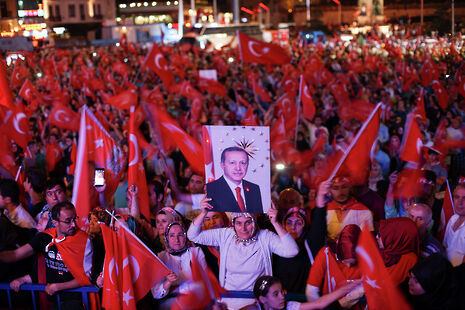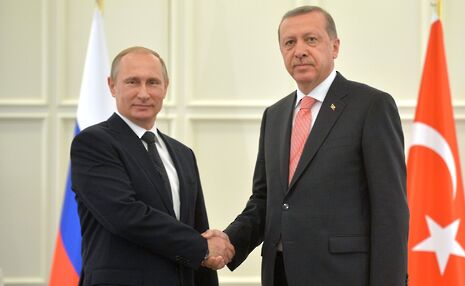Erdoğan: The Strong Man of Europe just got stronger
Turkey’s president has struck numerous blows to democracy

“Democracy”, Recep Tayyip Erdoğan said in a 1996 interview with Turkish daily Milliyet, “is rather like a bus. Once I reach my destination, I get off.” Claiming victory in a referendum giving him sweeping new powers, Erdoğan believes Turkey has reached its destination – an authoritarian one-party state.
Turkey has just voted ‘Yes’ to a presidential autocracy. New constitutional reforms will scrap the role of the prime minister, creating a new vice-president. The president, until now largely a ceremonial role, will be empowered as head of government as well as head of state. Parliament will no longer be able to scrutinise government ministers. The president would have the power to appoint cabinet ministers without requiring a confidence vote from parliament, propose budgets and appoint more than half the members of the nation’s highest judicial body. Erdoğan could be in power until 2029. With this slightest of victories, Erdoğan can claim legitimacy to the power he has seized in the last 12 years in office. His ruling Justice and Development Party (AKP) has shown an increasing intolerance of political opposition and public protest. Erdoğan has effectively dismantled the edifice of parliamentary democracy and civil liberties in Turkey.
There has been a concerted attack on press freedoms. Since 2002, several news outlets have been seized by the AKP and handed over to businesses close to the party. Journalists face prosecution for voicing dissent. In June 2016, a court placed journalist Erol Önderoğlu under arrest for disseminating ‘terrorist propaganda’ after participating in a solidarity campaign with Özgür Gündem, a pro-Kurdish publication, a move the United Nations Correspondents Association has described as “a grave violation of freedom of the press”.
The failed coup of July last year, triggering a state of emergency, accelerated this process of the destruction of liberties in Turkey. Around 35,000 people have been arrested for being ‘involved’ in the coup, this including 6,000 academics, 4,000 judges and prosecutors, and 24,000 policemen. In some instances, the executive simply bypasses the judiciary altogether. Turkey’s censorious Internet Authority (BKT) blocks online outlets through administrative orders – not court orders. This sort of dismantling of civil liberties conflicts with the European Convention of Human Rights (ECHR), to which Turkey is a signatory. Yet the ECHR states that a signatory can deviate from its laws if in a state of emergency.
To be sure, even within a state of emergency, semblances of an opposition exist in today’s Turkey. The Republican People’s Party (CHP), with its leader, Kemal Kılıçdaroğlu, has recently attacked the legality of the referendum, criticising the Supreme Electoral Council’s decision, requested by the AKP, of allowing voters to use non-official voting slips when it seemed there were not enough printed to satisfy the high turnout.
“Half of the country adores Erdoğan and half of the country loathes him”
Yet the prospects for any opposition look bleak. Having shored up his own political power through constitutional change and legal disintegration, Erdoğan holds all the cards when dealing with Kılıçdaroğlu’s proposed path of pure legalism.
Rather than testifying to his popularity, the referendum highlights Turkey’s deep divisions between a religiously-conservative Anatolian heartland which support his policies and those secular metropoles of Istanbul and Izmir which do not. A Pew Poll conducted in 2014 highlights a deep ambivalence towards Erdoğanism. Forty-eight per cent of those asked thought Erdoğan was having a good influence on the country; and 48 per cent believed he was negative. “Half of the country adores Erdoğan”, comments Soner Cagaptay of The Washington Institute for Near East Policy, “and half of the country loathes him.”
Erdoğan shows all the signs of a strongman just as authoritarianism enjoys renewed prestige on the world stage. Although fragile, Erdogan and fellow autocrat Vladimir Putin have recently enjoyed a sort of rapprochement. And in a speech in Ankara back in November, Erdogan said US President Trump’s election would bring “a new era in U.S.-Turkey relations”.

This illiberal global environment emboldens Erdoğan to change the terms of Turkey’s relationship with the world in a way his predecessors did not. He has bargained with EU leaders to stem the flow of refugees from Syria and Afghanistan. He has himself bullishly accused Germany and Netherlands of “Nazi practices” for prohibiting Turkish ministers from campaigning for ‘Yes’ in those countries. Erdoğan’s bellicosity seems to resonate with European Turks. According to German weekly Spiegel, 63.1 per cent of those living in Germany voted in favour of Erdogan’s referendum. “They like the fact that someone is finally showing the West, the EU, how things should be”, comments Detlef Pollack, a professor of the sociology of religion at the University of Münster. “It’s an expression of defiance”.
For Erdoğan, Turkey has reached its destination, and democracy can be discarded
 News / Cambridge study finds students learn better with notes than AI13 December 2025
News / Cambridge study finds students learn better with notes than AI13 December 2025 Features / Should I stay or should I go? Cambridge students and alumni reflect on how their memories stay with them15 December 2025
Features / Should I stay or should I go? Cambridge students and alumni reflect on how their memories stay with them15 December 2025 News / Uni Scout and Guide Club affirms trans inclusion 12 December 2025
News / Uni Scout and Guide Club affirms trans inclusion 12 December 2025 Comment / The magic of an eight-week term15 December 2025
Comment / The magic of an eight-week term15 December 2025 News / Cambridge Vet School gets lifeline year to stay accredited28 November 2025
News / Cambridge Vet School gets lifeline year to stay accredited28 November 2025








